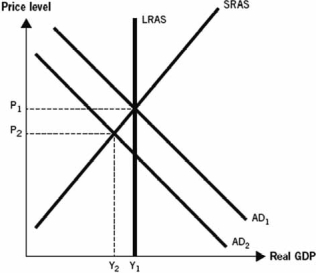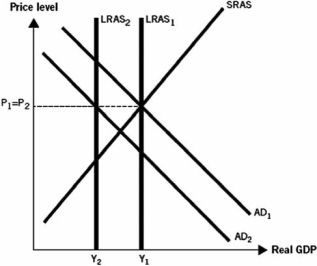Exam 14: The Great Recession, the Great Depression, and Great Macroeconomic Debates
Exam 1: Five Foundations of Economics 170 Questions
Exam 2: Model Building and Gains From Trade173 Questions
Exam 3: The Market at Work: Supply and Demand172 Questions
Exam 4: Market Outcomes and Tax Incidence170 Questions
Exam 5: Price Controls164 Questions
Exam 6: Introduction to Macroeconomics and Gross Domestic Product167 Questions
Exam 7: Unemployment173 Questions
Exam 8: The Price Level and Inflation174 Questions
Exam 9: Savings, Interest Rates, and the Market for Loanable Funds175 Questions
Exam 10: Financial Markets and Securities169 Questions
Exam 11: Economic Growth and the Wealth of Nations174 Questions
Exam 12: Growth Theory172 Questions
Exam 13: The Aggregate Demandaggregate Supply Model175 Questions
Exam 14: The Great Recession, the Great Depression, and Great Macroeconomic Debates175 Questions
Exam 15: Federal Budgets: the Tools of Fiscal Policy175 Questions
Exam 16: Fiscal Policy169 Questions
Exam 17: Money and the Federal Reserve174 Questions
Exam 18: Monetary Policy Learning Objectives169 Questions
Exam 19: International Trade173 Questions
Exam 20: International Finance175 Questions
Select questions type
If a classical economist were asked which factor is most important to ensuring economic growth, how might he or she respond?
Free
(Multiple Choice)
4.8/5  (32)
(32)
Correct Answer:
A
One difference between the Great Recession and the Great Depression is that
Free
(Multiple Choice)
4.8/5  (33)
(33)
Correct Answer:
D
Use the following graph to answer the next questions. This graph depicts an economy where aggregate demand has decreased, with no change in either short-run aggregate supply SRAS) or long-run aggregate supply LRAS).
 -During the Great Depression, the aggregate price level fell by 20 percent as depicted in the graph, suggesting that
-During the Great Depression, the aggregate price level fell by 20 percent as depicted in the graph, suggesting that
Free
(Multiple Choice)
4.8/5  (39)
(39)
Correct Answer:
B
When considering the basic operations of the macroeconomy, Keynesian economists argue that
(Multiple Choice)
4.8/5  (40)
(40)
If a Keynesian economist were asked to make a statement about the relationship between the government and the economy, what might he or she say?
(Multiple Choice)
4.9/5  (30)
(30)
Compare and contrast Keynesian and classical views on savings and government spending on the macroeconomy.
(Essay)
4.9/5  (28)
(28)
During the Great Recession, consumer sentiment in the United States declined, leading to a decrease in consumer spending. Which of the following factors caused this decrease in consumer sentiment?
(Multiple Choice)
4.8/5  (30)
(30)
Keynesian economists believe that prices are sticky and do not adjust quickly, from which they concluded that
(Multiple Choice)
4.8/5  (34)
(34)
The Great Depression lasted longer and was deeper than the average recession, in part, because
(Multiple Choice)
4.8/5  (41)
(41)
When considering how the economy works, classical economists hold that
(Multiple Choice)
4.9/5  (33)
(33)
When did the Great Recession begin and end? How many months did it last? When did the Great Depression begin and end? How many months did it last?
(Essay)
4.8/5  (32)
(32)
The Great Recession lasted longer and was deeper than the average recession, in part, because
(Multiple Choice)
4.8/5  (33)
(33)
Give three reasons why the Great Recession of 2007-2009 came to be known as the Great Recession.
(Essay)
4.9/5  (39)
(39)
Use the following graph to answer the next questions. The graph depicts an economy where aggregate demand and long-run aggregate supply LRAS) have decreased, with no change in short-run aggregate supply SRAS).
 -In the graph, we see that long-run aggregate supply decreased during the Great Recession. This was due to a decline in housing prices and the subsequent financial crisis. Why did these factors cause long-run aggregate supply to decrease?
-In the graph, we see that long-run aggregate supply decreased during the Great Recession. This was due to a decline in housing prices and the subsequent financial crisis. Why did these factors cause long-run aggregate supply to decrease?
(Multiple Choice)
4.8/5  (27)
(27)
During the Great Depression, aggregate demand in the U.S. economy decreased. As a result, the unemployment rate ________ and real gross domestic product (GDP) ________.
(Multiple Choice)
5.0/5  (38)
(38)
Keynesian economists believe that prolonged recessions are possible because
(Multiple Choice)
4.8/5  (42)
(42)
Showing 1 - 20 of 175
Filters
- Essay(0)
- Multiple Choice(0)
- Short Answer(0)
- True False(0)
- Matching(0)